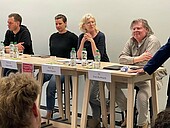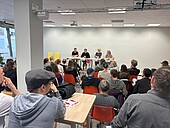Informative and long overdue panel discussion on the right of social workers to refuse to testify at the Social Innovation Lab
On May 7, 2025, a panel discussion on the topic of "The right of social workers to refuse to testify in criminal proceedings" took place in the well-attended Social Innovation Lab of HWG LU in the city center. The panel consisted of Dortmund lawyer and criminal defence lawyer Dr. Sven-U. Burkhardt, Professor Dr. Helen Breit from the Protestant University of Applied Sciences Freiburg and the spokesperson for the Alliance for a Right to Refuse to Testify in Social Work, Georg Grohmann. Professor Dr. Ines Woynar from Ludwigshafen University of Applied Sciences acted as moderator.
This topic has become topical due to a decision by the Karlsruhe district court on October 28, 2024, which sentenced three employees of a fan project to fines for attempted obstruction of justice. They had refused to give witness statements in connection with the so-called "pyro scandal" at a match between Karlsruher SC and St. Pauli in November 2022 due to their special relationship of trust with the fans. At that time, at least 11 spectators were injured as a result of pyrotechnics being set off.
In his welcoming address, the Dean of the organizing Departments of Social and Health Care at the university, Prof. Dr. Peter Rahn, surprised the audience with his statement that he himself had been present at the match at the time, which had ended 4:4. He did not expect the events to result in criminal proceedings against the social workers. Moderator Ines Woynar then gave a clear introduction to the - not easy - legal basis of the court decision.
This was followed by a detailed explanation of the right of social workers to refuse to testify in criminal proceedings by Sven-U. Burkhardt. Although they are obliged to maintain confidentiality about secrets entrusted to them in connection with their professional activities in accordance with Section 203 (1) No. 6 of the German Criminal Code, they must testify about these matters in criminal proceedings. This is because Section 53 of the Code of Criminal Procedure (StPO), which regulates the right to refuse to testify for certain professional groups, does not list social workers - with the exception of employees in pregnancy conflict counseling facilities. The Federal Constitutional Court also considered this to be constitutional in two decisions from 1972 and 1988; the court did see a right to refuse to give evidence "of its own kind", but according to Burkhardt this could only be accepted in very special exceptional constellations. Helen Breit pointed out that the issue of confidentiality in counseling is at the core of social work; it is not possible to build sustainable relationships if there is a risk that details of this counseling will have to be reported in a criminal trial. According to Georg Grohmann, a lot has changed since the Federal Constitutional Court's decision in 1972: The profession has become more professionalized and there are a number of concepts in social work. The decision would therefore certainly be different today. All discussants agreed with Ines Woynar's proposal to create a right to refuse to testify for social workers, which should be based on the criminal provision of § 203 StGB that applies to them: Such a right to refuse to testify would be limited to social workers who have state recognition and who are entrusted with a secret or otherwise become known. The question was also discussed as to whether a solution could be sought instead via the provision of Section 54 of the Code of Criminal Procedure: According to this provision, members of the public service require permission to testify from their superiors before testifying in criminal proceedings, which could then be handled restrictively if necessary. However, the panel agreed that nowadays social work is often carried out by independent organizations to which this provision does not apply. This provision could therefore be the basis for a solution to the issue if the scope of application were extended.
This was followed by a lively discussion with the participants, which showed that the problem of the (lack of) right of social workers to refuse to testify in criminal proceedings does not only affect fan projects. The high practical relevance of the topic has also been demonstrated in the past, for example in family or victim counseling or in street work. The event made it clear that it is time for legislators to address this issue. At the same time, all participants agreed that universities can make an important contribution to the further professionalization of social work.
Prof. Dr. Andreas Rein







